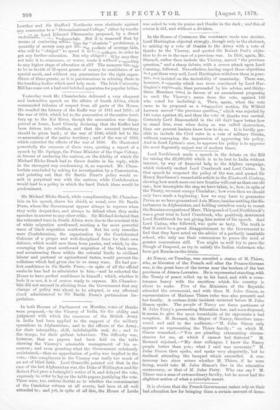In the House of Commons the resistance made was stouter..
Lord Hartington objected strongly, though only in the abstract, to mixing up a vote of thanks to the Army with a vote of thanks to the Viceroy, and quoted Sir Robert Peel's objec- tion to do so in the ease of a previous war. In r858, again, Mr.. Disraeli, rather than include the Viceroy, moved "the previous question," and a sharp debate, with a severe attack upon Lord Canning, followed. Nevertheless, having urged these objections at-i put them very well, Lord Hartington withdrew them in prac- tice, 0.-1 insisted on the desirability of unanimity. There was, however, a "..-rinority which was more convinced by Lord Har- tington's argutuonts, than persuaded by his advice, and thirty- three Members vol.,
1 in favour of an amendment proposing to omit the Viceroy), name from the vote, against 148 who voted for including it. Then, again, when the vote came to be proposed as a sa lastantive motion, Sir Wilfrid Lawson moved "the previous question," which was rejected by 140 votes against 28, and then the vote 04 thanks was carried.. Certainly Lord Beaconsfield in the old days knew better how to stand firm, even when doing so was called obstruction, than our present leaders know how to do so. It is hardly pos- sible to include the Civil ruler in a vote of military thanks, without conveying the impression of approving his policy. And in Lord Lytton's case, to approve his policy is to approve the most flagrantly unjust war of modern times.


































 Previous page
Previous page